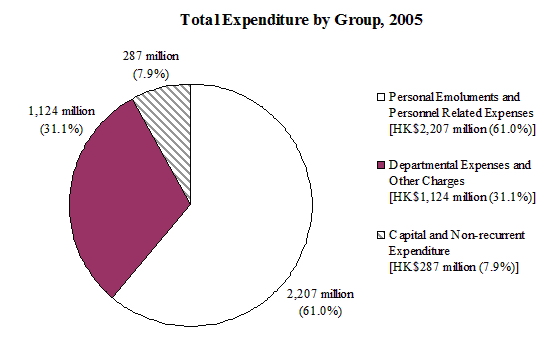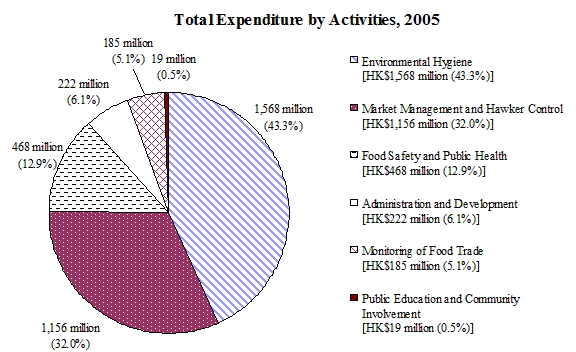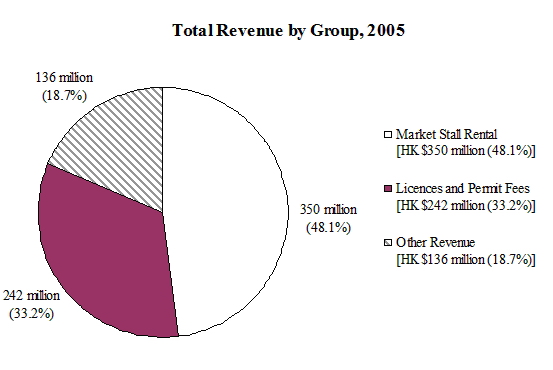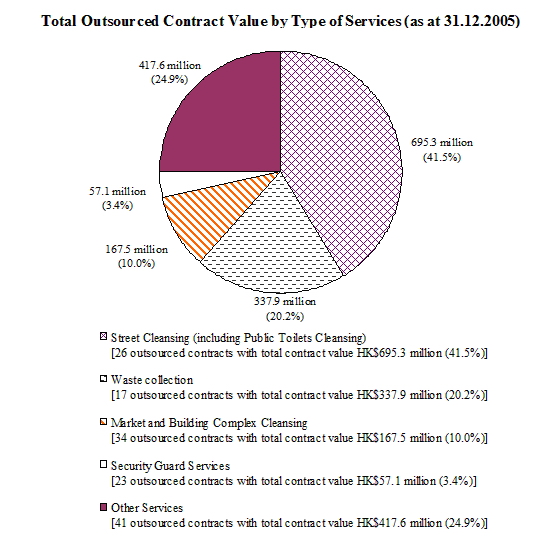The Administration and Development Branch provides various management and support services to the entire Department. These include staff management and development, financial management, information technology, planning and implementation of capital works projects, outsourcing of services, complaints management, public education and publicity on environmental hygiene and food safety.
Grade Management
There are three major grades covering Health Inspectors, Hawker Control Officers and Foreman, and two grade managers for Health Inspector and for Hawker Control Officer and Foreman grades. The grade managers are responsible for human resource management matters involving manpower planning, career development, postings, promotion and training.
The Health Inspector grade comprises six ranks - Senior Superintendent, Superintendent, Chief Health Inspector, Senior Health Inspector, Health Inspector I/II, and Student Health Inspector. They are responsible for various environmental hygiene and food safety functions, for example, environmental nuisance, licensing, prosecution, meat inspection, cleansing services, outsourcing, pest control, hawker control, management of markets, cemeteries and crematoria, food control and health education.
The Hawker Control Officer grade comprises five ranks - Principal Hawker Control Officer, Chief Hawker Control Officer, Senior Hawker Control Officer, Hawker Control Officer and Assistant Hawker Control Officer. They are responsible for controlling on-street hawking activities, managing hawker permitted places and taking law enforcement action against illegal hawking activities. They are also empowered to take legal action against people committing cleanliness offences, such as littering and spitting.
The Foreman grade comprises four ranks - Senior Overseer, Overseer, Senior Foreman and Foreman. They are mainly responsible for supervising the work of minor staff in market management, street cleansing, waste collection, pest control and monitoring the performance of the Department's service contractors. Members of the grade can also take legal action against cleanliness offenders.
Training
Vocational and general training is provided to staff to equip them with the necessary knowledge and skills to carry out their duties, to enhance professionalism and help them gain the pre-requisite qualifications for career advancement. Staff are provided with in-house programmes and those organised by local institutes and outside Hong Kong. An evaluation system is in place to measure the effectiveness of each programme.
In-house programmes are organised to improve the functional and core competence of staff. They are mainly designed, administered and conducted by the Department's Training Section.
Local academic institutes are appointed to administer and conduct commissioned programmes. Some of these lead to the award of qualifications that are pre-requisites for career advancement. Staff members are also sponsored to attend local public programmes whose contents are highly relevant to the Department's work.
Training outside Hong Kong is organised to improve staff skills and knowledge in functional competence, when it is difficult to arrange these programmes locally.
Management Services
Management consultancy and statistical services essentially make up the work of Management Services. The services help management improve the delivery of public services, monitor the standard of performance, and formulate policy in the provision of services and staffing.
Five major management studies were completed during the year - "Review of Hawker Records Offices", "Electronic Submission of Food and Other Trade Licence/ Permit Applications", "Review of Manpower Provision in Public Markets", "Review of Waste Collection Service", and "Review of Supervisory Structure of District Cleansing Sections". In addition, a number of statistical surveys were conducted on issues such as the effectiveness of printed health education publicity material, the food purchasing habits of households, and the effectiveness of publicity stickers on litter containers.
Ongoing consultancy services are provided to assist the implementation of recommendations of various studies, support the development and operation of a bar-coding file management system, and improve the design of departmental forms. Technical advice is offered to help client sections to undertake statistical surveys and analyse the data collected.
Financial Management
Breakdown of Expenditure by Expenditure Group (Chart)

| $M | Percentage | |
|---|---|---|
| Personal Emoluments and Personnel Related Expenses | 2,207 | 61.0% |
| Departmental Expenses and Other Charges | 1,124 | 31.1% |
| Capital and Non-recurrent Expenditure | 287 | 7.9% |
Breakdown of Expenditure by Activities (Chart)
Note: Figure may not add up to total due to rounding.
| $M | Percentage | |
|---|---|---|
| Environmental Hygiene | 1,568 | 43.3% |
| Market Management and Hawker Control | 1,156 | 32.0% |
| Food Safety and Public Health | 468 | 12.9% |
| Administration and Development | 222 | 6.1% |
| Monitoring of Food Trade | 185 | 5.1% |
| Public Education and Community Involvement | 19 | 0.5% |
Breakdown of Revenue (Chart)
| $M | Percentage | |
|---|---|---|
| Market Stall Rental | 350 | 48.1% |
| Licences and Permit Fees | 242 | 33.2% |
| Other Revenue | 136 | 18.7% |
All matters relating to expenditure and procurement, including payment processing, financial advice and monitoring, are handled by the Finance and Supplies Division.
In 2005, the Department spent $3,618 million, including $2,207 million on salaries and allowances and personnel related expenses, $1,124 million on departmental expenses and other charges, and $287 million on capital and non-recurrent expenditure.
By activities, the majority of the expenditure ($1,568 million) was on environmental hygiene. This was followed by $1,156 million for market management and hawker control, $468 million for food safety and public health, $222 million for administration and development, $185 million for monitoring the food trade, and $19 million for public education and community involvement.
In 2005, the Department received revenue of $728 million. Most of the revenue came from the rental of stalls in public markets managed by the Department ($350 million) and from licence and permit fees ($242 million). Other sources included fees for cemeteries and crematoria services ($63 million), fees for meat examination ($28 million) and other miscellaneous services ($45 million).
Information Technology
The Department uses information technology extensively to provide high quality services to the public. During the year, the upgrade of the personnel management computer system was completed to improve hardware efficiency, software workflow and user interface. In addition, the operating systems of many computers have been enhanced for greater operational reliability and security protection.
Internally, a number of IT projects are in progress:
- Under the government-wide Accessibility Programme to be completed in 2006, staff who currently do not have access to networked office automation personal computers will be provided with shared network personal computers installed with office automation software, Government-to-Employee (G2E) and Government-to-Government (G2G) computer applications and Internet access capability; and they will have their own e-mail account.
- The licence and permit system is being upgraded to provide more functions in processing applications for various restaurant licences, places of public entertainment licences, liquor licences, food permits and karaoke establishment permits and to automate more existing manual procedures to improve the efficiency of office operations. The upgrade will be completed in 2006.
- The development of 16 more e-forms is in progress to provide more options to the public for submitting licensing applications. This will be completed in 2006.
Looking ahead, the Department will continue to perfect its information technology infrastructure and computer systems, and implement IT projects cost effectively. For example:
- To enhance operational efficiency and improve public services, a study is under way to construct a central database system for maintaining records of animal admission, test monitoring and result logging in the Agricultural Chemicals Veterinary Drugs Unit.
- To improve operational effectiveness in analysing food sample test results in connection with food safety issues, risk assessment and food crisis handling, a proposal is being studied to link the existing food sampling record system with the food inspection system.
- To maintain a secure and up-to-date electronic messaging system equipped with the latest security protection for use in its various operations and offices, the Department is looking at upgrading its electronic mail servers and workstations. It hopes to start implementing the upgrade in 2006.
Capital Works
In the Government's 2005 Capital Works Resource Allocation Exercise, the five-year allocation on food and environmental hygiene services capital projects is estimated at $1,900 million. Of the total allocation, about $900 million is to meet expenditure on projects under construction or completed with outstanding accounts, while $1,000 million has been earmarked for new projects.
Markets
A cooked food market in Mong Kok and a new market in a multi-functional complex in Tai Kok Tsui were commissioned in October and December respectively. A new market in the Aldrich Bay Reclamation Area is under construction and the reprovisioning of the Wan Chai Market is in progress. Construction of the new shopping kiosks to replace the Stanley Temporary Market has also begun.
The Department has agreed to proceed with retro-fitting of air-conditioning in addition to general improvements to three markets and four Cooked Food Centres (a total of five projects) where at least 85% of the tenants supported such works. The markets and CFCs include:
- Bowrington Road CFC
- Fa Yuen Street CFC
- Fa Yuen Street Market
- San Hui Market
- Shek Wu Hui CFC
- Yue Wan CFC
- Yue Wan Market
Work on Bowrington Road CFC, Yue Wan Market and CFC and the Shek Wu Hui CFC has been completed, while work on the San Hui Market is in progress. The Fa Yuen Street Market and CFC projects are in the planning stage.
The Department will also carry out essential improvements to 11 of the markets and four CFCs. This will tie in with the latest building and fire safety requirements and other general works.
Improvements to the Bowrington Road Market have been completed, while funding approval has been obtained and work is under way for the following projects, which are scheduled for completion in early 2006:
- Aberdeen Market and CFC
- Ngau Chi Wan Market and CFC
- Ngau Tau Kok Market and CFC
Funding approval will be sought for:
- North Kwai Chung Market
- Po On Road Market and CFC
- Sheung Wan Market
- Tsuen Wan Market
- Tung Yick Market
- Wing Fong Street Market
- Yeung Uk Road Market
In addition, some other markets are due for fire services upgrading and general improvement works as part of a programme which is being implemented in phases since 2002-03.
Refuse Collection Points
As part of the continuing efforts to improve Hong Kong's living environment, the Department is replacing temporary roadside Refuse Collection Points with off-street facilities in enclosed buildings equipped with modern de-odorising installations. The RCPs at Hing Shing Road in Kwai Chung, Penny's Bay on Lantau and Lam Tsuen in Tai Po were completed during the year, and construction of the RCPs at Yee Kuk Street in Sham Shui Po and Tat Yan Square in Tuen Mun is in the pipeline.
The enlargement of the RCP at Shung Yan Street, Kwun Tong, is in progress, and planning is under way to upgrade another six village RCPs in Tai Po.
Public Toilets
New public toilets were completed in Sunny Bay on Lantau Island and the Lantau Link Viewing Platform on Tsing Yi. Construction of new public toilets is planned for the Kowloon Tong Public Transport Interchange in Kowloon Tong, Wing On Plaza Garden in Yau Tsim District, Tsam Chuk Wan in Sai Kung, Lo Wai Road in Tsuen Wan, Ma Liu Shui Waterfront and Science Park Road in Sha Tin, Pak Shek Kok in Tai Po, the New Wan Chai Market, the Stanley Complex and the Stanley Waterfront in Southern District, and Yee Kuk Street in Sham Shui Po. As part of the Public Toilet Improvement Programme, 11 public toilets and aqua privies were upgraded in 2005 and improvements to a further 58 are in progress or being planned. Under the capital works project for conversion of 100 aqua privies into flushing toilets initiated by the former Team Clean, eight aqua privies were converted into flushing toilets in 2005. Conversion of the remaining 92 aqua privies is in progress or being planned.
Cemeteries and Crematoria
The replacement of the six cremators at the Diamond Hill Crematorium is in progress, with work on Phases I and II scheduled for completion by early 2007 and late 2008 respectively. Planning is under way for the provision of seven coffin/skeletal cremators at the Wo Hop Shek Crematorium and the reprovisioning of nine cremators at the Cape Collinson Crematorium. The construction of 7,000 niches at Kwai Chung, Cape Collinson and Wo Hop Shek Columbaria is in progress and is scheduled for completion in 2006. Planning is under way to provide more niches at the Cheung Chau, Diamond Hill, and Kwai Chung columbaria and the Wo Hop Shek Cemetery.
Outsourcing of Services
Contracts (Chart)
| Services Contracted Out | No. | $M |
|---|---|---|
| Street Cleansing (including Public Toilets Cleansing) | 26 | 695.3 |
| Waste Collection | 17 | 337.9 |
| Market and Building Complex Cleansing | 34 | 167.5 |
| Security Guard Services | 23 | 57.1 |
| Other Services | 41 | 417.6 |
By the end of 2005, 141 contracts valued at $1,675.4 million were in force for the provision of services by private contractors. The outsourcing policy is aimed at greater cost-effectiveness and efficiency in the delivery of services.
Examples of outsourcing services include public market cleansing, street cleansing, waste collection, mechanical street sweeping, mechanical gully cleansing, building cleansing, security guard services, controlling mosquitoes in streams, animal carcass collection, cleansing and undergrowth cutting services for cemeteries and columbaria, and the collection of recyclables.
Measurable performance standards are written into the contracts to ensure the quality of services provided. Protective clauses have also been included in tenders to safeguard the rights and benefits of non-skilled workers. Supervisory checks are conducted to ensure compliance by contractors.
Complaints Management
The Complaints Management Section is responsible for formulating and reviewing policies on, and procedures for, handling all types of complaints. During the year, 137,962 complaints were received by the Department, including 136,633 relating to the services it provides.
The section conducts independent investigations into staff-related complaints other than those concerning crime, corruption, serious misconduct and dereliction of duty. In addition to taking immediate follow-up action on the complaints and replying to complainants, the section analyses the complaints according to their type, nature and causes to enable remedial action or improvements to be taken.
Quality Assurance
Continuous improvement is one of the priority tasks of the Department to ensure provision of quality services to the public.
The Quality Assurance Section is mainly responsible for conducting day-to-day regulatory inspections on services provided by the Department. Recommendations are made for improvements to services where inadequacies in existing operational systems, procedures and guidelines are identified. The section also recommends good performers for Quality Assurance Awards to motivate meritorious and hardworking front-line staff. In addition, the section investigates cases of dereliction of duty in an independent, objective and fair manner.
Public Education and Publicity
Public education plays an important role in almost all the Department's activities and initiatives, forming part of an integrated approach to ensuring food safety and improving environmental hygiene. To achieve this, the Department organises publicity and educational programmes, and arranges exhibitions, outreaching programmes and seminars for the general public to enhance their awareness of these issues.
The Department operates the Communication Resource Unit at the Fa Yuen Street Municipal Services Building in Mong Kok and the Health Education Exhibition and Resource Centre inside Kowloon Park in Tsim Sha Tsui.
The Health Education Exhibition and Resource Centre provides group visits and guided tours to schools, voluntary agencies and the public. Seminars and activities are also conducted regularly. During the year, the Centre attracted 156,082 visitors, and organised 1,034 talks, exhibitions and activities for kindergartens, primary schools and secondary schools; 931 talks for elderly centres; and 377 talks for new arrivals and members of the public. Audio-visual aids, question-and-answer sessions, demonstrations and games were used to enrich and enliven the learning process. For the Communication Resource Unit, 87 school talks and 50 talks for the general public were organised in 2005.
On food safety, various publicity and educational programmes were organised on nutrition labelling, genetically modified food, the HACCP system (Hazard Analysis and Critical Control Point), and "poon choi". Train-the-trainer workshops on nutrition labelling and GM food were organised for members of youth centres, women's associations and parent-teacher associations.
Food safety messages on HACCP and "poon choi" were also promoted through different channels, such as Food Safety Day, food hygiene seminars, videos featuring local and international celebrities, as well as printed and electronic health education material. Food surveillance results were regularly released to help consumers make informed choices when buying food.
To cater for the specific needs of the food trade, seminars on restaurant licensing were arranged on a bi-monthly basis for those who had applied for licences for food premises or who were thinking of opening a food business.
On environmental hygiene, the Department launched a new publicity drive in mid-2005, which included special radio and television messages and advertising displays at bus shelters and railway stations. Banners, posters and pamphlets were also produced. The key messages encouraged the public to continue keeping Hong Kong clean and to promote public health. Anti-rodent and anti-mosquito campaigns were organised to solicit public support and participation in controlling pests.
The Department also provided $1.8 million to District Councils and local organisations to subsidise cleansing activities and campaigns organised to encourage community involvement in keeping Hong Kong clean.
Occupational Safety and Health
The Department is firmly committed to achieving a high standard of occupational safety and health for all staff members at work, and has taken a number of OSH measures, including forming a Departmental Safety Management Committee and organising various promotional activities. In 2005, to further improve OSH standards, the Department undertook a number of initiatives, including:
- establishing a high-level working group involving senior management to monitor injury-on-duty (IOD) situations and to discuss matters relating to OSH policy, improvement measures and, where necessary, individual IOD cases;
- drawing up a work plan to upgrade the OSH standard of refuse collection points;
- mandatory OSH training courses for all Workmen II, Foremen and Overseers of refuse collection points;
- updating the departmental OSH Manual and providing all staff members with a copy of relevant OSH guidelines relating to their duties;
- participation of the Departmental OSH Ambassador Team in 22 activities organised by the Occupational Safety and Health Council in 2005, including visits, seminars, and talks; and
- participation by management and staff in the Civil Service OSH Day organised by the Civil Service Bureau in which the Department was named the 1st runner-up.


